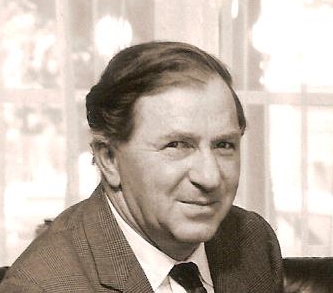When architectural duo Powell and Moya designed Chichester Festival Theatre in the early ‘60s they brought in Structural Engineer Charles Weiss. Weiss had previously worked with them on the Skylon Folly for the Festival of Britain in 1951.
Weiss’ daughter, Emma Cole, has given Pass It On an account of his life and career that helped to build Chichester Festival Theatre and its pioneering suspension roof.
Charles Weiss (1914 – 1985)
My father Charles was born in Budapest in 1914 to Jewish parents. His life as an émigré started early in the 1930s when he was forced through the numerus clausus to go to university in Brno, Czechoslovakia where he studied architecture. He completed his doctorate of architecture in 1936 in Florence where he also worked before moving to Milan.
In 1939 as the European scene worsened, he was offered a passage to Shanghai and managed to secure refuge in Singapore along the way. He worked there as a structural and architectural designer until 1942, escaping on 13 February 1942 just before Singapore was captured by the Japanese. He reached Bombay in March 1942 where he joined the British Army and gained a commission to the Corps of the Royal Engineers. He served mainly in Assam and Burma, eventually commanding an Indian Sapper Company as a Major.
Charles Weiss became a naturalised British subject in 1947, moved to London, and started work with the London County Council. He then joined the firm of consulting engineers Scott and Wilson where he worked on the ground-breaking Skylon structure for the Festival of Britain and Churchill Gardens in Pimlico with architects Hidalgo Moya and Sir Philip Powell.
Charles Weiss founded his own structural engineering partnership in 1954 and over the next 20 years was right at the centre of the post war building surge with its radical new look and philosophy. He worked with Powell and Moya on many projects, as well as with other key names such as Erno Goldfinger (Trellick Tower, Kensington), Derek Stow (Thamesmead Health Centre), Howard Goodman (Greenwich District Hospital) and James Roberts (The Rotunda offices, Birmingham).
Charles Weiss’ work with Powell and Moya made perhaps the biggest imprint, starting with the Skylon in 1951 and including such key builds as the Chichester Festival Theatre (1962), the British Pavilion for the 1970 Expo in Osaka, Japan, Wolfson College, Oxford (1974) and the Museum of London (1976). In remembering Weiss’ gifts as designer and mathematician, Sir Philip gave particular mention to the structure of Chichester Festival Theatre where his work was very much on show in the tension of the structure, “so tense that the severing of one of the delicate, much stressed roof cables could have broken not just the roof itself but the aided cantilevers of the robust beams which supported it.”
He was appointed CBE in 1974 for recognition of his extensive work on hospitals and schools.


